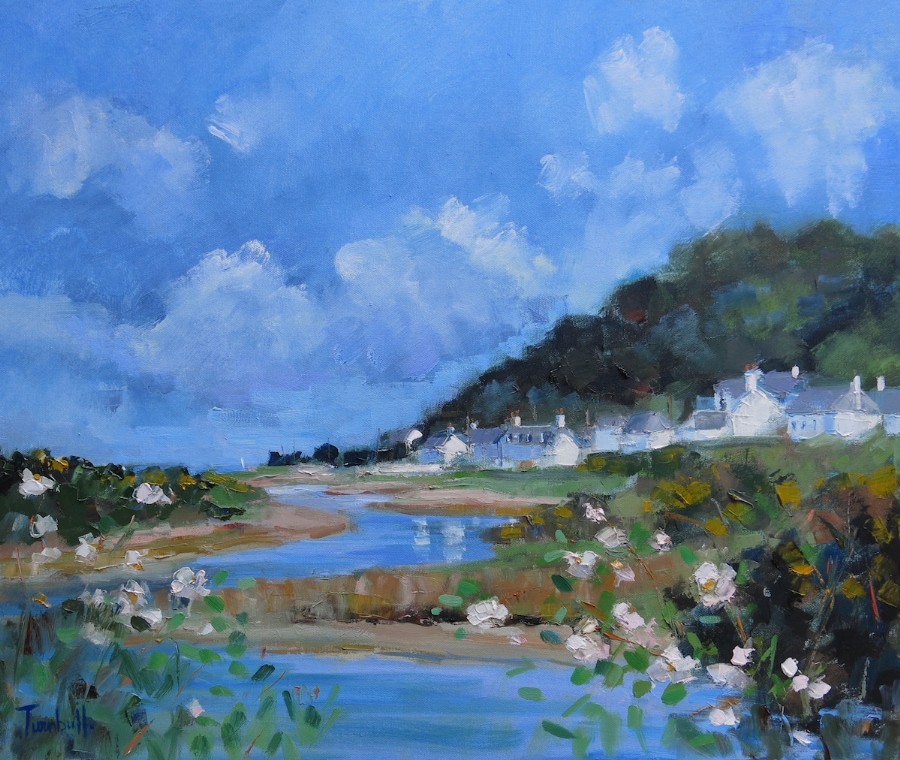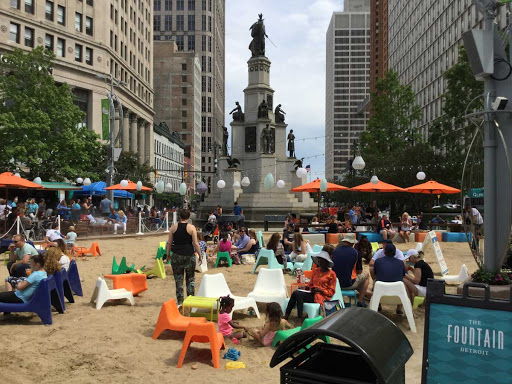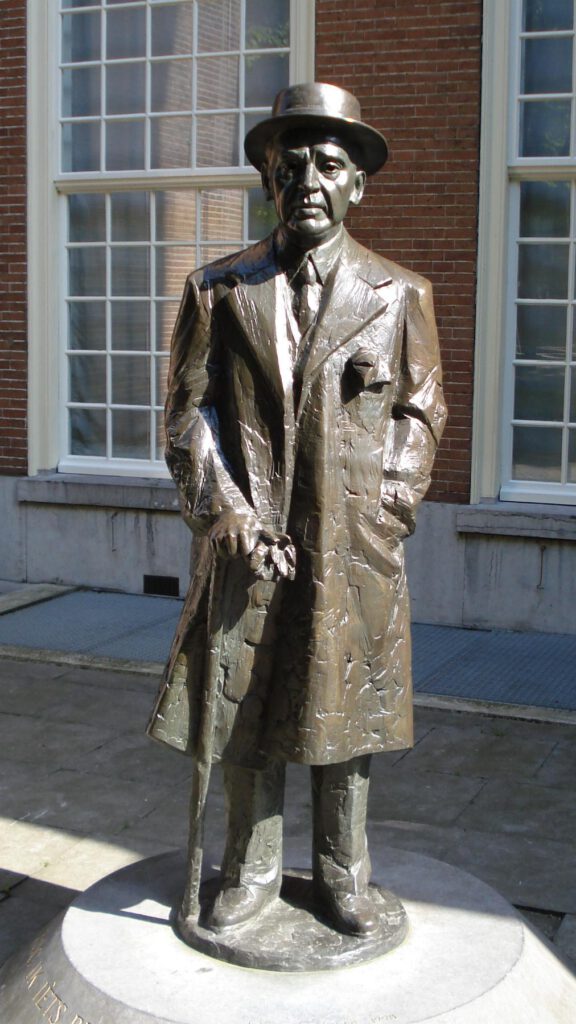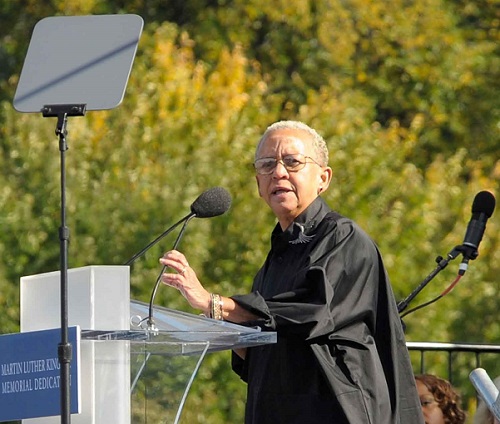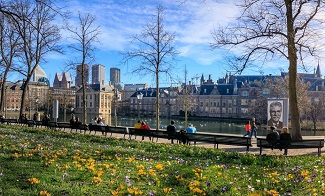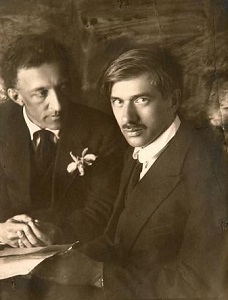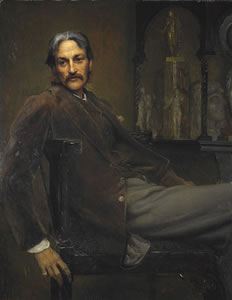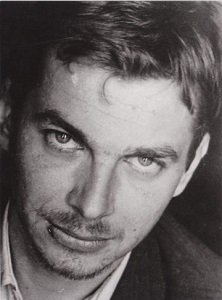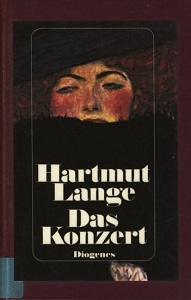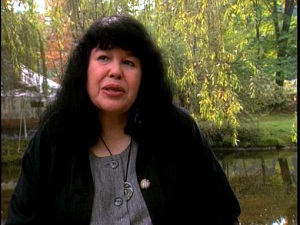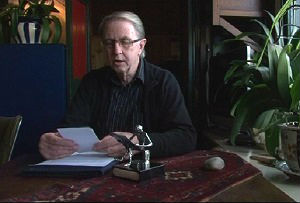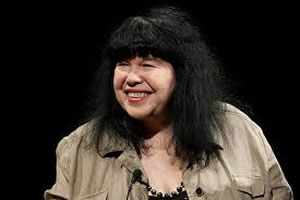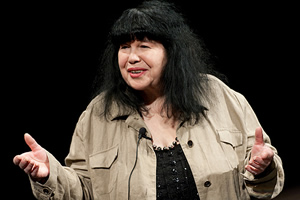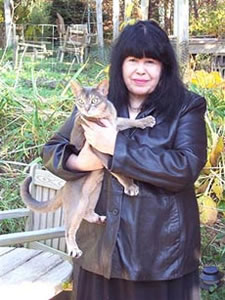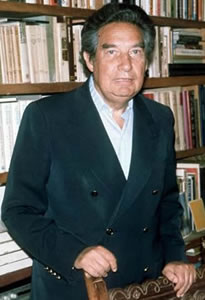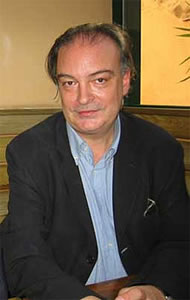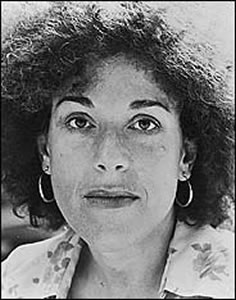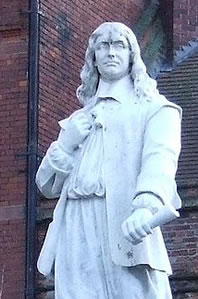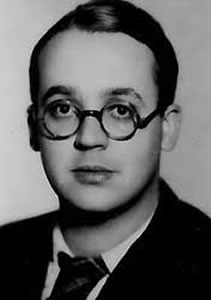De Nederlandse schrijfster en journaliste Marga Minco, pseudoniem van Sara Minco, werd geboren in Ginneken op 31 maart 1920. Zie ook mijn blog van 31 maart 2007 en ook mijn blog van 31 maart 2008.
Uit: De Val
“‘En die open put?’
‘Jij staat er toch bij? Is er iets met je ogen?’
‘Had het deksel er dan zolang opgelaten.’
‘Onzin. Kan ie intussen uitblazen.’
Verstrijen keek zijn maat na, die zich met kleine, stijve passen verwijderde en door een zijdeur in het gebouw verdween. De hete damp uit de put kwam recht op hem af. Een paar seconden lang werd hij er helemaal door omhuld. Hij stapte blindelings achteruit, wreef over zijn gezicht en bette met zijn vingerknokkels zijn tranende ogen. Stom van hem om tegen de wind in te gaan staan. Weer had hij die verontrustende ervaring dat hitte en kou hem op hetzelfde moment overvielen en murw maakten.
Hij begon heen en weer te benen, de kraag van zijn jekker op, zijn handen in zijn zakken. Hij was rillerig, hij had zin in een sigaret, maar hij vond het te koud om er een te draaien. Op het deksel van de GEB-put bleef hij staan en speurde de gevel van het gebouw af. Misschien verscheen er weer ergens een mooie meid in een kecke trui voor het raam. Als ze tegen hem lachte was het goed. Maar het enige wat hij zag was een streng ogende man in een donker pak die hem vluchtig bekeek en zich meteen omdraaide. De kloot.
Ik had het niet moeten doen, dacht hij. Je loste er niets mee op. Met zijn jas al aan was hij naar de slaapkamer gelopen. Hij wist dat ze deed of ze sliep en het had hem opnieuw razend gemaakt. Hij had haar uit bed gesleurd en even met het warme, slaperige lichaam geen raad geweten. Toen had hij uitgehaald. Tewijl ze terugviel op het dek was hij de deur uit gestormd.”

Marga Minco (Ginneken, 31 maart 1920)
De Mexicaanse schrijver, dichter, en diplomaat Octavio Paz werd geboren op 31 maart 1914 in Mixcoac, tegenwoordig een deel van Mexico-stad. Zie ook mijn blog van 31 maart 2007 en ook mijn blog van 31 maart 2008.
Between going and staying the day wavers
Between going and staying the day wavers,
in love with its own transparency.
The circular afternoon is now a bay
where the world in stillness rocks.
All is visible and all elusive,
all is near and can’t be touched.
Paper, book, pencil, glass,
rest in the shade of their names.
Time throbbing in my temples repeats
the same unchanging syllable of blood.
The light turns the indifferent wall
into a ghostly theater of reflections.
I find myself in the middle of an eye,
watching myself in its blank stare.
The moment scatters. Motionless,
I stay and go: I am a pause.
Brotherhood
Homage to Claudius Ptolemy
I am a man: little do I last
and the night is enormous.
But I look up:
the stars write.
Unknowing I understand:
I too am written,
and at this very moment
someone spells me out.
Octavio Paz (31 maart 1914 – 19 april 1998)
De Roemeense dichter en essayist Nichita Stănescu werd geboren op 31 maart 1933 in Ploieşti. Zie ook mijn blog van 31 maart 2007 en ook mijn blog van 31 maart 2008.
Sentimental story
Then we met more often.
I stood at one side of the hour,
you at the other,
like two handles of an amphora.
Only the words flew between us,
back and forth.
You could almost see their swirling,
and suddenly,
I would lower a knee,
and touch my elbow to the ground
to look at the grass, bent
by the falling of some word,
as though by the paw of a lion in flight.
The words spun between us,
back and forth,
and the more I loved you, the more
they continued, this whirl almost seen,
the structure of matter, the beginnings of things.
Unwords
He offered me a leaf like a hand with fingers.
I offered him a hand like a leaf with teeth.
He offered me a branch like an arm.
I offered him my arm like a branch.
He tipped his trunk towards me
like a shoulder.
I tipped my shoulder to him
like a knotted trunk.
I could hear his sap quicken, beating
like blood.
He could hear my blood slacken like rising sap.
I passed through him.
He passed through me.
I remained a solitary tree.
He
a solitary man.
Vertaald door Thomas Carlson and Vasile Poenaru
Nichita Stănescu (31 maart 1933 – 13 december 1983)
De Spaanse schrijver Enrique Vila-Matas werd geboren in Barcelona op 31 maart 1948. Vila-Matas is een van de belangrijkste hedendaagse Spaanse auteurs. Hij is een internationale bestsellerauteur sinds hij in 2003 voor De waan van Montano zowel de Premio de la Crítica ontving als de prestigieuze Prix Médicis voor het beste buitenlandse boek van het jaar.
Uit: Paris hat kein Ende (Vertaald door Petra Strien)
„Ich reiste nach Key West, Florida, und meldete mich bei dem diesjährigen Wettbewerb für Doppelgänger des Schriftstellers Ernest Hemingway an. Die Veranstaltung fand im ›Sloppy Joe’s‹ statt, der Lieblingsbar des Autors in Cayo Hueso im äußersten Süden von Florida. Ich brauche wohl kaum zu erwähnen, dass die Teilnahme an diesem Wettbewerb – der einen großen Zulauf von kräftigen, graubärtigen Männern verzeichnete, allesamt auf lächerliche Weise detailversessene Hemingwaydoubles – ein einmaliges Erlebnis war.
Seit ich durch zu viel Alkoholgenuss ein wenig beleibter werde, bilde ich mir in den letzten Jahren – trotz der gegenteiligen Ansicht meiner Frau und meiner Freunde – ein, Hemingway, dem Idol meiner Jugend, immer ähnlicher zu werden. Zwar hat mir darin noch nie jemand Recht geben wollen, doch ich bin nun einmal dickköpfig und habe mich daher im letzten Sommer kurz entschlossen bei dieser Veranstaltung beworben, um alle eines Besseren zu belehren.
Vorweg sei gesagt, dass ich mich entsetzlich blamiert habe. Ich bin also tatsächlich nach Key West gereist, habe an dem Wettbewerb teilgenommen und schnitt als Letzter ab; besser gesagt, ich schied vorzeitig aus; na ja, man hat mich disqualifiziert, und was das Schlimmste ist, nicht etwa wegen meines falschen Bartes – davon haben sie gar nichts bemerkt –, sondern weil ich angeblich »jeglicher Ähnlichkeit mit Hemingway entbehrte«.
Enrique Vila-Matas (Barcelona, 31 maart 1948)
De Amerikaanse schrijfster en feministe Marge Piercy werd geboren op 31 maart 1936 in Detroit. Zie ook mijn blog van 31 maart 2007 en ook mijn blog van 31 maart 2008.
Always Unsuitable
She wore little teeth of pearls around her neck.
They were grinning politely and evenly at me.
Unsuitable they smirked. It is true
I look a stuffed turkey in a suit. Breasts
too big for the silhouette. She knew
at once that we had sex, lots of it
as if I had strolled into her diningroom
in a dirty negligee smelling gamy
smelling fishy and sporting a strawberry
on my neck. I could never charm
the mothers, although the fathers ogled
me. I was exactly what mothers had warned
their sons against. I was quicksand
I was trouble in the afternoon. I was
the alley cat you don’t bring home.
I was the dirty book you don’t leave out
for your mother to see. I was the center-
fold you masturbate with then discard.
Where I came from, the nights I had wandered
and survived, scared them, and where
I would go they never imagined.
Ah, what you wanted for your sons
were little ladies hatched from the eggs
of pearls like pink and silver lizards
cool, well behaved and impervious
to desire and weather alike. Mostly
that’s who they married and left.
Oh, mamas, I would have been your friend.
I would have cooked for you and held you.
I might have rattled the windows
of your sorry marriages, but I would
have loved you better than you know
how to love yourselves, bitter sisters.
Marge Piercy (Detroit, 31 maart 1936)
De Amerikaanse schrijfster Judith Rossner werd geboren als Judith Perelman op 31 maart 1935 in New York. Zij groeide op in de Bronx. Zij verliet het City College of New York om te trouwen met de docent en schrijver Robert Rossner. Judith Rossner is bekend geworden met haar roman Looking for Mr. Goodbar uit 1975, in 1977 verfilmd met Diane Keaton in de hoofdrol. Het succes van dit boelk evenaarde zij niet meer, maar zij bleef schrijven.
Uit: Perfidia
„I was five in 1976, when my mother packed me and her other possessions into our station wagon, said goodbye to my father and drove me away from our home in the cool, lush little town of Hanover, New Hampshire. We rode around and across the country for months before we came to rest in Santa Fe, where we met Wilkie at the first restaurant we went to. She must have gotten pregnant with my brother about two hours later. I think she and Wilkie broke sexually early on, but they never stopped being involved, one way and another.
My father was–is, I imagine–a professor of American history at Dartmouth. A true academic. I was an excellent student. A model girl, when I was in school. My mother said later she”d thought I wouldn”t know the difference if she took me away from my father, he cared so little about me. We don”t always remember things the same way. Didn”t always. In fact, she remembered things differently from one time to the next. Some of her stories had a sad version and a funny version, with such a difference between the two that you had no idea of what had actually happened.”
Judith Rossner (31 maart 1935 – 9 augustus 2005)
De Engelse romanschrijver en essayist John Fowles werd geboren in Leigh-on-Sea (Essex) op 31 maart 1926. Zie ook mijn blog van 31 maart 2007 en ook mijn blog van 31 maart 2008.
Uit: French Lieutenant’s Woman
“They stopped. He stared at the black figure, “But I’m intrigued. Who is this French lieutenant?”
“A man she is said to have . . .”
“Fallen in love b&nwith?”
“Worse than that.”
“And he abandoned her? There is a child?”
“No. I think no child. It is all gossip.”
“But what is she doing there?”
“They say she waits for him to return.”
John Fowles (31 maart 1926 – 5 november 2005)
De Duitse schrijver Hartmut Lange werd geboren op 31 maart 1937 in Berlijn. Toen hij twee jaar was verhuisde de familie naar Polen. In 1946 kwamen hij en zijn moeder terug in Berlijn. Hij studeerde dramaturgie in Berlin-Babelsberg en was daarna tot 1964 dramaturg aan het Deutsche Theater in Oost-Berlijn. In 1965 verliet Lange de DDR. Sinds 1982 schrijft hij voornamelijk verhalen en novellen. In 2003 ontving hij de Italo Svevo Prijs.
Uit: Missing Persons (Vertaald door Helen Atkins)
„Henninger liked the courteously restrained manner in which they advised him, and was fully aware how inappropriate it was to enter a shop like this merely with the aim of getting rid of a soaked pair of shoes. He looked around, and they showed him a collection of classic and more modern styles. Their shoes were sent to all parts of the world, they explained to Henninger, so that in the end he was prepared to hand over his calling card. Once the measurements had been taken he was allowed to specify all the details according to his own wishes, and he ordered lace-up shoes with three pairs of eyelets, and asked that the pattern on the toecap should be kept as simple as possible. Before he left the shop he was given a pair of light rubber galoshes, and a date was set for the fitting. They assured him that at that stage he could still have some adjustments made to the uppers.
No sooner had Henninger left the shop than he started to regret his decision. On the other hand, ‘Where in all the world,’ he thought, ‘can one still have shoes made-to-measure and sent to one’s home?’
He considered it essential to keep the appointment that had been arranged. And as a result he was able to experience Venice in perfect weather. He stayed on at the same hotel, and went back to the station to change the sleeping-car reservation.
“Two days more or less will hardly make any difference now,” thought Henninger. And that afternoon, when, in a more confident mood induced by the weather, he made another attempt to reach the centre of the city on foot, he had the encounter for which he was somehow already prepared.“
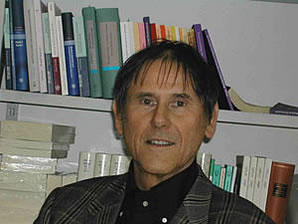
Hartmut Lange (Berlijn, 31 maart 1937)
De Engelse dichter Andrew Marvell werd geboren in Winestead, Yorkshire op 31 maart 1621 in Londen. Zie ook mijn blog van 31 maart 2007.
The Fair Singer
TO make a final conquest of all me,
Love did compose so sweet an enemy,
In whom both beauties to my death agree,
Joining themselves in fatal harmony;
That while she with her eyes my heart does bind,
She with her voice might captivate my mind.
I could have fled from one but singly fair,
My disentangled soul itself might save,
Breaking the curled trammels of her hair.
But how should I avoid to be her slave,
Whose subtle art invisibly can wreath
My fetters of the very air I breathe?
It had been easy fighting in some plain,
Where victory might hang in equal choice,
But all resistance against her is vain,
Who has th’advantage both of eyes and voice,
And all my forces needs must be undone,
She having gained both the wind and sun.
Andrew Marvell (31 maart 1621 – 16 augustus 1678)
Standbeeld in Hull
De Engelse schrijver en vertaler Edward FitzGerald werd geboren in Woodbridge, Suffolk, op 31 maart 1809. Zijn faam berust vooral op het feit dat hij het werk van de 11e/12e-eeuwse Perzische schrijver en wetenschapper Omar Khayyám in het Westen bekendmaakte. Hij gaf een Engelse versie van diens gedichten uit onder de titel The Rubáiyát of Omar Khayyám (1859).
Uit: Rubaiyat of Omar Khayyam
1
Awake! for Morning in the Bowl of Night
Has flung the Stone that puts the Stars to Flight:
And Lo! the Hunter of the East has caught
The Sultan’s Turret in a Noose of Light.
2
Dreaming when Dawn’s Left Hand was in the Sky
I heard a Voice within the Tavern cry,
“Awake, my Little ones, and fill the Cup
“Before Life’s Liquor in its Cup be dry.”
Vertaald door Edward FitzGerald
Edward FitzGerald (31 maart 1809 – 14 juni 1883)
De Schotse dichter, schrijver en journalist Andrew Lang werd geboren op 31 maart 1844 in Selkirk. Tegenwoordig is hij vooral nog bekend wegens zijn vele artikelen over folklore, mythologie en religie.Ook publiceerde hij veel sprookjesverzamelingen. Hij leidde lange tijd de sectie literatuurkritiek in Longman´s Magazine en gaf de werken van Robert Burns uit.
Ballade of the Optimist
Heed not the folk who sing or say
In sonnet sad or sermon chill,
“Alas, alack, and well-a-day,
This round world’s but a bitter pill.”
Poor porcupines of fretful quill!
Sometimes we quarrel with our lot:
We, too, are sad and careful; still
We’d rather be alive than not.
What though we wish the cats at play
Would some one else’s garden till;
Though Sophonisba drop the tray
And all our worshipped Worcester spill,
Though neighbours “practise” loud and shrill,
Though May be cold and June be hot,
Though April f
reeze and August grill,
We’d rather be alive than not.
And, sometimes on a summer’s day
To self and every mortal ill
We give the slip, we steal away,
To walk beside some sedgy rill:
The darkening years, the cares that kill,
A little while are well forgot;
When deep in broom upon the hill,
We’d rather be alive than not.
Pistol, with oaths didst thou fulfil
The task thy braggart tongue begot,
We eat our leek with better will,
We’d rather be alive than not.
Andrew Lang (31 maart 1844 – 20 juli 1912)
De Franse schrijver, dichter en journalist Robert Brasillach werd geboren in Perpignan op 31 maart 1909. Brasillach bezocht het lyceum van Sens, vervolgens het lyceum Louis-le-Grand te Parijs. In 1928 ging hij studeren aan de befaamde Ecole Normale Supérieure te Parijs. Hij werd er, als 26ste op 28 in het ingangsexamen, toegelaten in de literatuur-afdeling. Nog tijdens zijn studies publiceerde hij zijn eerste boek Présence de Virgile. Aangetrokken door het Italiaans fascisme en het Duits nationaal-socialisme, was hij samen met Drieu La Rochelle, een bekende fascistische schrijver van zijn tijd in Frankrijk. Hij zou er zwaar voor boeten. Ondanks een genadeverzoek van François Mauriac aan Charles de Gaulle werd hij op 6 februari 1945 terechtgesteld wegens collaboratie. Na zijn dood werd het werk van Brasillach gepropageerd door de letterkundige Maurice Bardèche, die tevens zijn schoonbroer was. Het oeuvre van Brasillach bestaat uit romans, essays, poëzie, en enkele theaterstukken.
Uit: Le marchand d’oiseaux
„L’hiver, voyez-vous, racontait le marchand d’oiseaux à Isabelle, l’hiver, notre profession est bien pénible. Si je n’avais pas l’habitude, si je ne prenais pas tant de soins, tous mes oiseaux mourraient. Je n’en ai jamais beaucoup, vous le voyez. Une cage pour les quatre perruches, une cage pour les serins. Ils m’aiment bien, ils me connaissent, et ils essaient de ne pas mourir pour ne pas me faire de la peine… C’est déjà assez pénible pour moi, lorsque j’en vends un. Figurez-vous qu’hier, une dame m’a arrêté, dans la rue, et qu’elle a regardé les perruches. Elle m’a demandé les prix, ce que ça mangeait. Et puis elle est partie, j’ai eu bien peur.“
Robert Brasillach (31 maart 1909 – 6 februari 1945)
Zie voor onderstaande schrijvers ook mijn blog van 31 maart 2007.
De Vlaamse schrijver, vertaler en publicist Peter Motte werd geboren in Geraardsbergen op 31 maart 1966.
